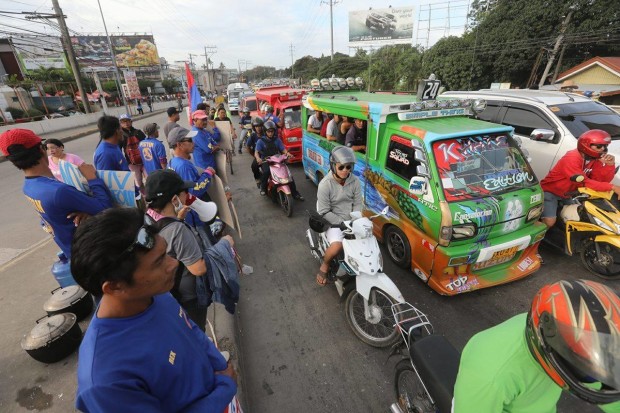
This was the scene early Monday (Feb. 27, 2017) in Cebu City when jeepney drivers protesting the phaseout of old jeepneys went on strike and were seen convincing other jeepney drivers to join the protest. Later, even jeepneys that did not join the strike had to park their vehicles after schools suspended their classes. TONEE DESPOJO/CDN
CEBU CITY—Not all jeepney drivers in this city joined the strike against the government’s plan to phase out units that were at least 15 years old. However, they were forced to park their jeepneys because they hardly had passengers to ferry to their destinations.
Drivers decided not to ply their routes in this city after some schools suspended their classes, said Rudy Laconza of the Alliance of Transport Organization Member Intra Cebu City (Atomic).
“How can the drivers go to work when there are no classes?” Laconza said in an interview over radio station dyAB.
While the Cebu City government didn’t suspend classes in the city, several private schools decided not to hold classes due to the strike.
Private schools that suspended classes included the University of San Jose Recoletos on Magallanes Street, the University of San Carlos elementary and high school departments and Colegio del Sto Niño.
Laconza said in his radio interview that students represented the majority of public utility jeepney (PUJ) passengers while about 20 to 30 percent were workers.
Cebu City Councilor Dave Tumulak, deputy mayor for police matters, said several drivers complained about the city’s deployment of buses because these competed with the few PUJs on the streets.
“Some drivers had asked that the buses not be deployed since these would eat up their earnings,” he said.
Tumulak said he had been monitoring the progress of the transport strike to determine the necessity of deploying more buses.
City Hall had sent out seven buses since 6 a.m. to ferry passengers.
The Pinag-isang Samahan nga mga Tsuper at Opereytor Nationwide (Piston) members started to converge in several parts of Cebu City as early as 4 a.m.
They were outside Shopwise in Barangay Basak, the Land Bank of the Philippines’ branch along Osmeña Boulevard, Andoks in Barangay Mabolo and Fooda in Barangay Banilad. SFM/rga